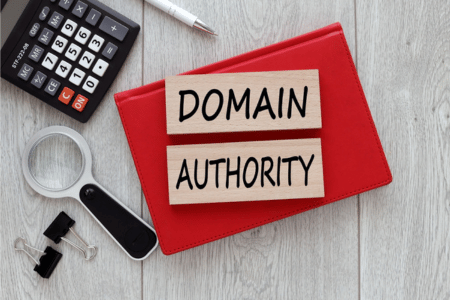In the constantly evolving world of SEO, understanding the difference between domain authority and page authority is crucial for any online strategy. The phrase “domain authority vs. page authority” often comes up in conversations about website optimization, but do we truly understand what it means and, more importantly, how to improve?
| Factor | Domain Authority | Page Authority |
| Definition | A score that predicts the likelihood of the entire domain’s rank on search engine result pages. | A score that predicts the likelihood of a single page’s rank on search engine result pages. |
| Scope | Provides a holistic view of the entire website’s ranking potential. | Focuses on the ranking potential of individual pages. |
| Role in SEO Strategy | Used to understand the website’s overall competitiveness in the industry. | Used to identify and optimize high-value or underperforming individual pages. |
| Strategies for Improvement | Involves broad strategies such as improving overall site structure, producing quality content, and building quality backlinks. |
Involves more focused, page-specific strategies such as on-page SEO, content quality, and social signals. |
| Measurement | Based on a complex algorithm that includes link profile, MozRank, MozTrust, and many other factors. | Similar to DA, but applies the algorithm to a single page rather than the entire domain. |
What is Domain Authority?
 Domain Authority (DA) is more than just a term in the SEO industry; it’s a key metric that provides a comprehensive snapshot of your website’s standing in the digital landscape. It is a search engine ranking score developed by Moz, indicating the likelihood of a website ranking on search engine result pages (SERPs). This score ranges from 1 to 100, with higher scores corresponding to a greater potential to rank.
Domain Authority (DA) is more than just a term in the SEO industry; it’s a key metric that provides a comprehensive snapshot of your website’s standing in the digital landscape. It is a search engine ranking score developed by Moz, indicating the likelihood of a website ranking on search engine result pages (SERPs). This score ranges from 1 to 100, with higher scores corresponding to a greater potential to rank.
A common misconception is that DA is purely about the number of links pointing to your site. However, the truth is, it’s more about the quality of those links.
High-quality, relevant backlinks from credible sites have a much higher impact on your DA than a larger number of poor-quality links.
Domain Authority is also a reflection of your overall SEO health. It considers numerous factors, including linking root domains, the number of total links, MozRank, MozTrust, social signals, and many other elements. It’s a compound metric that reflects the strength of your entire website.
However, it’s important to understand that DA is not a metric used by Google and does not increase your SERP rankings directly. Instead, it’s a comparative tool used to compare the competitive landscape of a website. A higher DA indicates that a website is more likely to rank better than websites with lower DAs.
What is Page Authority?
Like Domain Authority, Page Authority (PA) is a crucial metric in SEO, but it operates on a smaller scale. Instead of measuring an entire website’s ranking strength, PA measures a single webpage’s potential to rank on search engine result pages (SERPs). PA, just like DA, is scored on a 100-point logarithmic scale, with a higher score indicating a greater ability to rank.
While DA looks at the aggregate power of your entire domain, PA focuses on the potency of individual pages. It examines several SEO signals for a specific page, including link count (both internal and external), link quality, social signals, and many other factors. It’s a composite score that aggregates all of these various signals into a single metric that gives you an idea of how powerful, trustworthy, and authoritative a single page is in the eyes of search engines.
One key factor to remember is that PA, like DA, is a comparative metric, not an absolute one. It’s intended to give you an idea of how one specific page will rank compared to other pages. So, a page with a PA of 40 might rank higher than one with a PA of 30 for a given keyword.
It’s also important to note that while DA can give you a good understanding of how your overall domain is likely to perform, PA can help you understand which pages are the most (and least) likely to perform well in SERPs, which can be incredibly useful when you’re planning your SEO strategy, as it helps you identify which pages need more work, and which ones are already likely to rank well.
Domain Authority vs. Page Authority: Unpacking the Differences
Domain Authority and Page Authority, both vital metrics in SEO, serve different purposes and provide unique insights into your website’s performance. While they are interconnected, their main differences lie in the scale and focus of their assessments.
Scale of Assessment
Domain Authority evaluates the ranking potential of your entire website. It gives you a holistic view of your website’s standing in the digital landscape, considering all pages under your domain. On the other hand, Page Authority assesses the ranking strength of a single webpage, providing a granular view of your website’s performance.
Focus of Optimization
While improving Domain Authority requires a more comprehensive SEO strategy targeting the entire website, Page Authority optimization is more page-specific. For DA, you’re considering factors that impact your whole website, such as overall site structure and a network of quality backlinks. In contrast, PA optimization might focus more on specific on-page SEO strategies and the content quality of individual pages.
Impact on SEO Strategy
When devising an SEO strategy, DA provides insights into how your overall website might rank on SERPs. It is crucial to understand your site’s competitiveness in your industry. However, PA can help identify which pages need improvement or are performing well.
How to Boost Your Domain Authority
Improving your Domain Authority should be integral to your long-term SEO strategy. It is a continuous process that demands meticulous planning and consistent effort. Here are some key strategies that you can employ to enhance your DA effectively:
Improve Your Overall SEO
Your Domain Authority is largely dependent on your overall SEO health. Here’s how you can ensure it:
 Site Structure: A logically structured site with clear navigation can help search engines index your website more effectively. Implement a clean and intuitive site hierarchy to enhance user experience and search engine readability.
Site Structure: A logically structured site with clear navigation can help search engines index your website more effectively. Implement a clean and intuitive site hierarchy to enhance user experience and search engine readability.- URL Structure: User-friendly URLs are not just easier for your visitors to understand, but they are also more efficient for search engines to crawl. Ensure your URLs are readable and descriptive of the content on the page.
- Relevant Content: Consistently create and update your website with high-quality, relevant content, helping to increase site traffic, reducing bounce rate, and improving the chances of earning quality backlinks, all of which positively influence your DA.
Create Linkable Content
Linkable content is high-quality, unique content that naturally attracts backlinks from other websites.
- Quality: High-quality content is informative, well-researched, and offers value to the reader. This kind of content can establish your website as an authority in your field, making it more likely that other websites will want to link to you.
- Uniqueness: Unique content stands out from the crowd. If your content provides a fresh perspective, original data, or an innovative approach, it increases the chances of attracting high-quality backlinks.
- Engagement: Engaging content keeps your audience interested, increasing the chances they will share it on their networks, leading to increased visibility and more potential backlinks.
Implement a Strong Internal Link Structure
Internal linking refers to linking your website pages to each other, which helps spread link equity across your site, making it easier for search engines to index your pages and enhancing the user experience by providing them with relevant content.
- Relevance:Link to related content within your site, which helps users find more information and keeps them engaged with your site longer.
- Navigation: Use internal links to guide users and search engine bots through your site, which helps improve the user experience and makes your site easier to crawl.
Remember, improving your Domain Authority is a marathon, not a sprint. It demands patience, consistency, and strategic planning. However, the pay-off is worth it: a higher DA can significantly enhance your visibility on SERPs, leading to increased traffic and, ultimately, conversions. At Oyova, we offer you the expertise and support you need to improve your Domain Authority and achieve long-term SEO success effectively.
How to Elevate Your Page Authority: A Detailed Strategy
While Page Authority operates more granularly than Domain Authority, improving it is equally crucial for your overall SEO success. Here are some comprehensive strategies that can help you effectively enhance your Page Authority:
Publish Quality Content
Quality content is the backbone of any successful SEO strategy. Here’s how it impacts your Page Authority:
 Engagement: High-quality, engaging content attracts users and keeps them on your page longer, reducing the bounce rate, which is a positive signal to search engines.
Engagement: High-quality, engaging content attracts users and keeps them on your page longer, reducing the bounce rate, which is a positive signal to search engines.- Originality: Original content can distinguish your page from others. If you offer unique insights or fresh information, you increase the chances of other websites linking to your page, thereby improving your Page Authority.
- Relevance: Content that aligns with your users’ interests and your industry niche is more likely to attract targeted traffic. This increased relevance can lead to better user engagement and higher chances of gaining quality backlinks.
Optimize On-Page Content
On-page optimization is a key factor in improving your Page Authority. Here’s what you can do:
- Title Tags: A well-optimized title tag is essential for both search engine rankings and click-through rates. Make sure your title tag is descriptive, contains your target keywords, and is within the recommended length.
- Image Alt Tags: Search engines cannot understand images, but they can understand the text associated with them. Adding alt tags to your images not only aids in accessibility but also provides an opportunity to signal to search engines what the image (and thus the page) is about.
- Content Itself: Make sure your content is well-structured, uses relevant keywords naturally, and provides valuable information to the user.
Remove Bad Links
The quality of your backlinks significantly influences your Page Authority. Regularly auditing your backlink profile and removing or disavowing bad links is important. These could be links from spammy or irrelevant websites that could negatively impact your Page Authority.
Remember, similar to Domain Authority, enhancing your Page Authority is a long-term process. It requires a consistent and strategic approach. However, the benefits are worth the effort – a higher Page Authority can lead to better search engine rankings and increased organic traffic. At Oyova, we help you navigate these complexities, offering tailored strategies to effectively boost your Page Authority and, ultimately, your digital success.
Services to Improve DA and PA
Understanding “domain authority vs. page authority” is a crucial aspect of your SEO strategy. By focusing on both, you can ensure a strong presence on SERPs, which can lead to increased traffic and conversion rates. Remember, it’s not about choosing one over the other but rather understanding how they can work together to boost your overall SEO strategy.
At Oyova, we can help you navigate the complexities of SEO and develop a strategy that increases both your Domain and Page Authority. Our clear and concise approach ensures that your SEO strategy is not just about improving rankings but about establishing a robust online presence that brings long-term benefits. Contact us today to learn more about our comprehensive SEO services and how we can help transform your digital strategy.
